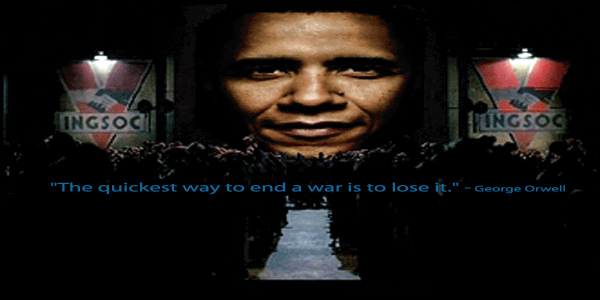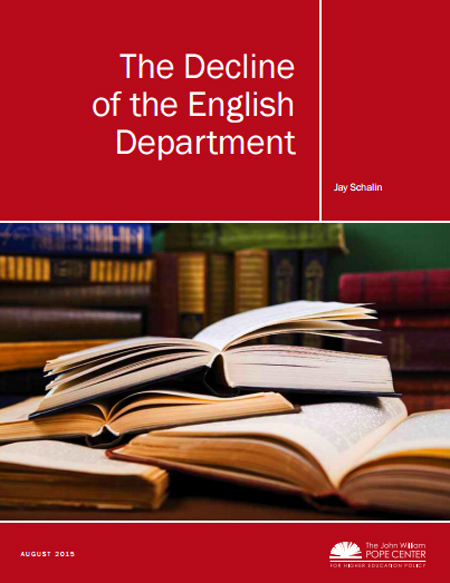"Are the humanities in trouble on American campuses? That is certainly the impression one gets from the media today; articles in publications of both left and right describe the increasing flight from the humanities into other disciplines.
But is it all hype? After all, the blogosphere is always full of 'next big things' or 'imminent collapses' that never come to pass. And many academics scoff at the idea that the humanities are suffering from any sort of existential crisis.
To find out the real situation, I explored what is going on in one of the main humanities disciplines, English. Concentrating on English departments and their faculties in the University of North Carolina system, I used a mix of empirical and qualitative methods to look behind all the rhetoric and wagon-circling.
The result is the newly released report, The Decline of the English Department. And as the title indicates—the decline is far from hype. By almost any measure, English departments are diminishing numerically, dropping standards, or calcifying into a hard-left intellectual status quo.
That is not to say that there are not pockets of excellence in the discipline. Nor does it mean that English departments are going to be closing up shop anytime soon. But they are besieged by negative trends on almost every front, from politicized course content to ebbing enrollment.
Outside pressures, such as increasing emphasis on vocational training at the university level and a generational reduction of students’ interest in contemplative pursuits such as the study of literature, are depressing enrollment. At most UNC schools, there has not yet been a wholesale retreat from the English major, as there has been elsewhere. At the University of Maryland, for example, the number of English majors fell by 40 percent from 2012 to 2014.
Many English departments have taken proactive approaches to fend off the decline in enrollment, mostly by making drastic changes to the English curriculum to make it more appealing to students. This means more emphasis on writing and technology courses that will help prepare students for employment, and it also means more courses that are entertaining. An example of the latter phenomenon include such courses as UNC-Chapel Hill’s 'CMPL 55: First Year Seminar: Comics as Literature.'
Much of the decline is self-inflicted. As the English discipline moves farther away from its core of the greatest works of English, American, and European literature, either to attract students or for political reasons, its very reason for existing is reduced. As New York Times columnist David Brooks put it, the humanities “are committing suicide because they have lost faith in their own enterprise.” And English may be leading the pack over the cliff.
Politicization is a particularly destructive force in the humanities because it directly affects what students learn. The leftwing bent of English department faculties is indisputable; I identified 261 tenured (or tenure-track) professors in the UNC system who teach literature and are registered to vote in North Carolina. Only 10 were registered Republicans—a mere 4 percent—as opposed to 196 Democrats (55 were registered as Independent). Furthermore, by examining professors’ curricula vitae, university profiles, LinkedIn and Facebook pages, and published articles, I found that there is a very significant generational shift in professors intellectual attitudes: their research or Internet profiles reflect an increasing focus on such favored topics of the left as identity politics or collectivism.
Just because a professor is liberal does not mean he or she brings politics into the classroom; certainly, many liberal professors, particularly the older ones, take great care to teach objectively. But en vogue scholarship methods are transforming even the teaching of very traditional literature. Formerly, the emphasis was on studying literary works in order to understand the meaning of the author’s words as he or she intended them to be understood. A new generation of literary scholars, however, has been trained to read literature to uncover hidden structures of modern political concerns, such as racism or classism.
Or to focus on their own feelings rather than on the meaning intended by the author. According to Columbia University professor Andrew Delbanco, writing in the New York Times Review of Books in 1999:
The point of writing and teaching was now less to illuminate literary works than to mount a performance in which the critic, not the instigating work, was the main player.
Additionally, I was able to uncover more than a few professors who openly put politics ahead of scholarship. For instance, Amanda Wray, who teaches writing courses at UNC-Asheville, states on her LinkedIn page that:
In all the courses I teach, students can expect to talk and think critically about intersecting structures of oppression including racism, homophobia, sexism, and classism.
Exactly how her hyper-political agenda will make students better writers is unclear. And it is very unlikely that these topics are discussed in an objective, even-handed manner from multiple perspectives, as controversial subjects are supposed to be taught in college.
Even though activism is not supposed to enter into a college classroom at a public university, it appears to be fully accepted in Asheville’s English department. Wray’s colleague Anne Jansen has written an article entitled: “Literary Activism: An Aesthetic Political Strategy for the Twenty-First Century,” which is “under consideration with American Literature.” Some of her 'Scholarly Presentations' include:
- '‘I didn’t even notice you weren’t white’: Queering Colorblindness in the ‘Post-Racial’ Classroom';
- 'Lesbian Cowboys: Queering the Wild West Through Blood Memory and Literary Activism';
- 'Politics in the Classroom: What It Means to Teach US Ethnic Literatures.'
My criticism of one younger professor at UNC-Chapel Hill for being an activist has already proven prescient. I cited Neel Ahuja, who recently received tenure, for the two major themes in his writing and research: animal rights and post-colonialism. The report went to press in the middle of August; less than two weeks later, Ahuja received national attention for his class “Literature of 9/11” which 'explores the Sept. 11 terrorist attacks from the perspective of radical Islamists and those who view America as an imperialist nation.'
And the problem is not just politicization. Current trends are also effecting a coarsening, a clouding of the barriers between low and high cultures, that makes one question what purpose the curriculum serves. William Boone is an associate English professor at Winston-Salem State University. He is described on the website of Wake Forest University, where he was a guest speaker, as teaching:
…courses on hip-hop, gender, popular culture, and African American culture. His research interests include cultural and music criticism, cultural history, popular culture, and African American masculinity. Dr. Boone’s most recent research examines the interface between Major League Baseball iconography, hip hop aesthetics and the decline of African American involvement in the sport of baseball.
Boone’s dissertation at Temple University was 'The Beautiful Struggle: An Analysis of Hip-Hop Icons.'
As awful as many of the research topics I uncovered may be, the real news may be even worse. It seems that the some professors have attempted to scrub their pasts of work that has gained, or could gain, them notoriety. One case is that of UNC-Wilmington’s Alessandro Porco, whose master’s thesis and first book consisted of obscene and childish poems, mostly written in honor of Porco’s favorite kinky porn star. His early writing is no longer mentioned on the UNC-Wilmington website, most likely due in part to the Pope Center’s exposure given him at the time he was hired.
'Hired' is a key concept for the future of English departments. Porco was chosen over 100 other applicants, according to the then-acting department head. Since hiring decisions at universities are made by departmental colleagues, it is likely that current trends will only intensify. People prefer to associate with those who share their ideas—college professors are no less likely to choose 'their own.'
I looked at advertisements for tenure track literature positions in the Chronicle of Higher Education, the industry standard for posting job openings. Overwhelmingly, the ads conveyed a clear preference for applicants with non-traditional perspectives.
And with the older generation, which is more rooted in traditional scholarship, being replaced by younger Ph.D.s who are steeped in left-wing politics and a 'pop culture as high culture' lowering of standards, it is hard to see a way out of the downward cycle.
That does not mean that the study of great literature will die. While many English departments may indeed become incongruous catch-all majors for students who just want any degree, or become highly politicized niche programs for politically motivated students (joining such departments as gender studies), others may shrink to their core in order to keep the traditional literary canon alive. As history, political science, and economics professors have developed alternate institutions in the form of independent academic centers, so may literature professors.
But even if the study of great literature that seeks understanding as intended by its authors has to leave the academy, it will continue somewhere. Because it has great value in so many ways."



